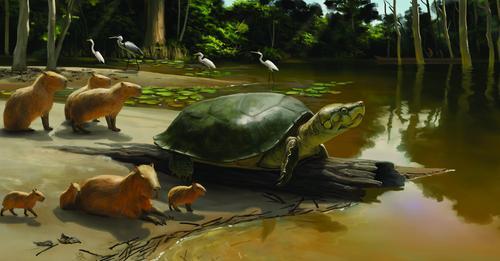#Senckenberg Center for Human Evolution and Paleoenvironment
Explore tagged Tumblr posts
Text

Newly discovered fossil of giant turtle is named after Stephen King novel character
Senckenberg Research Institute and Natural History Museum
An international research team led by Dr. Gabriel S. Ferreira from the Senckenberg Center for Human Evolution and Paleoenvironment at the University of Tübingen has described a new species of giant turtle from the late Pleistocene. Peltocephalus maturin is between 40,000 and 9,000 years old and comes from the Brazilian Amazon. With a shell length of about 180 centimeters, the species is one of the largest known freshwater turtles in the world. The armored reptile was named after the giant turtle "Maturin," a fictional character created by best-selling author Stephen King. With a maximum shell length of 140 centimeters, the Asian narrow-headed softshell turtle (Chitra chitra) together with the approximately 110-centimeter-long South American river turtle (Podocnemis expansa) is one of the largest freshwater turtles alive today...
Read more: https://phys.org/news/2024-03-newly-fossil-giant-turtle-stephen.html
49 notes
·
View notes
Text
IN UNA NUOVA RICERCA, LA DIETA DELL'UOMO DELLA PIETRA...
IN UNA NUOVA RICERCA, LA DIETA DELL’UOMO DELLA PIETRA…
Uno studio isotopico sui resti umani provenienti dalle Grotte di Serinyà, in Catalogna, ha dimostrato che il pesce non era nella dieta dei cacciatori-raccoglitori dell’Europa meridionale di 27.000 anni fa. I gruppi umani della Penisola iberica, nel periodo Tardo gravettiano, mangiavano principalmente piante e mammiferi terrestri come conigli, cervi e cavalli. Un team internazionale di ricercatori…

View On WordPress
#Dorothée Drucker#Grotte di Serinyà#Institut de Recerca Històrica#Joaquim Soler#Periodo Gravettiano#Senckenberg Center for Human Evolution and Paleoenvironment#Università di Girona#Università di Tubinga
1 note
·
View note
Text
ARCHEOSTUDI / I popoli preistorici sopravvissuti all'ultima Era Glaciale? Si estinsero in Italia
#ARCHEOLOGIA #STUDI / I popoli preistorici sopravvissuti all'ultima Era Glaciale? Si estinsero in Italia: lo rivela uno studio internazionale pubblicato su #Nature @Nature | @UNI_FIRENZE | @UniPadova | @Unibo | @unipisa | @unisiena | @unipa_it | @univca
Ricostruzione di un cacciatore-raccoglitore associato alla cultura gravettiana (32.000-24.000 anni fa), ispirata ai reperti archeologici del sito di Arene Candide (Italia) (foto: Tom Bjoerklund) Con il più grande set di genomi di cacciatori-raccoglitori europei preistorici mai realizzato, un gruppo di ricerca internazionale, a cui ha partecipato l’Università di Firenze, ha riscritto la storia…

View On WordPress
#archeologia#biologia#cacciatori-raccoglitori#dna#era glaciale#genetica#Max Planck Institute for Evolutionary Anthropology di Lipsia#Nature#paleoantropologia#Preistoria#Senckenberg Center for Human Evolution and Paleoenvironment#studi#Università di Bologna#Università di Cagliari#Università di Firenze#Università di Padova#Università di Palermo#Università di Pechino#Università di Pisa#Università di Siena#Università di Tubinga
1 note
·
View note
Text
Evidence of slash-and-burn cultivation during the Mesolithic
Evidence of slash-and-burn cultivation during the Mesolithic
As early as 9,500 years ago, people in Europe used slash-and-burn methods to make land usable for agriculture. This is shown by environmental data generated by scientists from the Senckenberg Center for Human Evolution and Paleoenvironment (S-HEP) at the University of Tübingen on the basis of two drill cores from the Ammer Valley. The data were then correlated with results from the Mesolithic…
View On WordPress
2 notes
·
View notes